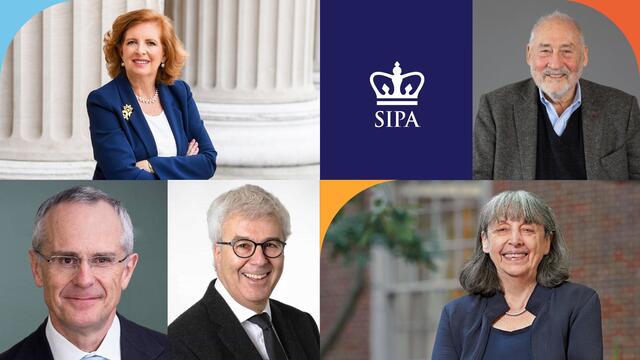

2023 Niejelow Rodin Global Digital Futures Policy Forum
Platform Regulation: Overcoming the Barriers
The European Union is leading the way with regulating big tech through, among other efforts, the Digital Services Act, Digital Markets Act, comprehensive privacy regulations, and planned support for the Media Freedom Act. But which laws make sense for other parts of the world and what can others learn from the successes and failures of the EU? As part of an ongoing series of events organized by SIPA’s Technology Media and Communications specialization and Columbia World Projects, this day of discussions will bring together regulators, academics and leading civil society organizations to focus on what a new regulatory model can and should look like.
Are global or regional approaches possible, or is jurisprudential specificity and nation-by-nation regulation necessary? Is collaboration with large platforms plausible, or is policy muscle required? Within the policy options, are competition and antitrust approaches more viable than taxation and intellectual property routes?
Join us for a gathering of academics, civil society representatives, and policy makers from around the world to discuss these questions and build momentum for effective policy making.
Date and time
Thursday, March 30 | 5 - 6:30 p.m. EDT
Location
International Affairs Building
420 West 118th Street Room 1501 New York, NY 10027
Schedule
9:00 a.m. | Opening Remarks
9:15 a.m. - 10:45 a.m. | Panel 1: Making Big Tech Pay For News
10:45 a.m. - 11:15 a.m. | Coffee Break
11:15 a.m. - 12:45 p.m. | Panel 2: Adapting The Digital Services Act
12:45 p.m. - 2:15 p.m. | Lunch Break
2:15 p.m. - 4:00 p.m. | Panel 3: Competition Policy
4:00 p.m. - 4:15 p.m. | Coffee Break
4:15 p.m. - 5:15 p.m. | Next Steps And Closing Remarks
Panels

-
In 2021 Australia used competition law to require Google and Facebook to pay publishers for the news they used. The rationale behind this path-breaking legislation was that competition law could mitigate the power imbalance between news outlets and big tech. It was a pragmatic piece of legislation which, after some debate, received support from across the political spectrum as well as strong resistance from Facebook and Google. Other countries are considering emulating Australia and Indonesia is implementing their own version. Canada is also tabling a version soon while the US version of this legislation, the Journalism Competition and Preservation Act, has been stalled. This panel will examine global prospects for Bargaining Codes, whether they would work well in other countries, and how to handle resistance–including lobbying and threats–from big tech.
Moderator: Courtney Radsch, UCLA Institute for Technology, Law and Policy
Panelists:
- Rod Sims, Professor of Public Policy, Australian National University; Former Chair, Australian Competition and Consumer Commission (ACCC)
- Pak Usman, General Director, Public Information and Communication, Ministry of Communication and Information Technology, Indonesia
- Taylor Owen, Professor, Max Bell School of Public Policy, McGill University
-
This panel will examine the replicability of the EU’s Digital Services Act in regions beyond Europe. Is this comprehensive legislation something that other countries can and should adopt? If so, how should it be adapted? Regulators in other parts of the world have already signed agreements on information exchange and in February 2023 UNESCO is holding a meeting to discuss how the DSA can be adapted globally and the implications for countries which don’t have independent regulators or judiciary and may not support freedom of speech. The discussion will consider the failures and successes of these legislative efforts.
Moderator: Anya Schiffrin
Panelists:
- Christel Schaldemose, Member, European Parliament
- Vera Franz, Deputy Director, Open Society Information Program, Open Society Foundations
- Guilherme Canela de Souza Godoi, Chief of the Section for Freedom of Expression and Safety of Journalists, UNESCO
- Mathias Vermeulen, Public Policy Director; Affiliated Researcher AWO; Centre for Law, Science, Technology and Society at the Vrije Universiteit Brussels
- Nouri Lajmi, President, High Independent Communication Authority (HAICA), Tunisia
- Latifa Akharbach, President, High Authority for Audiovisual Communication (HACA), Morocco
- (Discussant) Justice Luís Roberto Barroso, Supreme Federal Court of Brazil
-
This panel will seek to lay the groundwork for a steering group to explore prospects for adjusting and adopting elements of the Digital Markets Act. There is quite limited competition in the arena of digital platforms. These platforms have used their market power, not only to enhance their profits at the expense of others, but to enhance market power in other arenas: including the use of information advantages to dominate certain online product markets and to extract consumer surplus. Differentiated pricing undermines principles underlying the efficiency of the market economy. Network externalities and their information advantage create almost insurmountable barriers to entry. These platforms use their market power to shape political discourse, including advancing legislation which entrenches their power and makes them less accountable for their harms. Old approaches to antitrust (e.g. embedded in merger guidelines) may not be suitable. Rather, it may be desirable to bar mergers that risk reducing competition in the future; to restrict price competition; or to have stronger rules concerning conflicts of interests. Regulators and scholars who are working on competition will discuss the advantages, limitations, and risks of different approaches and the role that global cooperation might play.
Moderator: Joseph Stiglitz
Panelists:
- James Hodge, Deputy Commissioner, Economic Research Bureau Competition, Commission South Africa
- Alexandre de Streel, Academic Director, European Law, CERRE
- Gideon Mokaya, Manager, Enforcement and Compliance, Competition Authority of Kenya
- Ana Maria Prieto, Payment System Department Director, Central Bank of Colombia

Overcoming the Barriers
Organizers & Sponsors
Event Partners
Columbia SIPA, Technology, Media, and Communication Specialization
Columbia World Projects, Columbia University
Initiative for Policy Dialogue
Foundation for European Progressive Studies
With support from
We also are deeply grateful to the Niejelow/Rodin family for their generous support.
